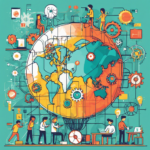Bangladesh’s Faceoff with AI and the Human Rights Predicament

“In Bangladesh We Taken Artificial Intelligence(AI) As a Tool to Develop Our Health System, Smart Traffic System and We as Using AI How We Can Actually Make Life Easier Than Before”– Zunaid Ahmed Palak MP, State Minister, ICT Division, Bangladesh.
AI, the science and engineering of creating systems that can perform tasks that usually require human intelligence, such as learning, reasoning and decision-making. AI can be applied to various domains, such as computer vision, natural language processing, speech recognition, robotics etc. AI can also be classified into different types, such as narrow AI, which can only do one specific task and general AI, which can do any task that a human can do.
AI has revolutionized various sectors, including healthcare, transportation, finance and entertainment, offering unprecedented efficiency and innovation. However, its widespread adoption has raised concerns about job displacement and reskilling, bias and discrimination, transparency and accountability, privacy concerns, social and economic inequality, human-AI collaboration, ethical AI development, worker autonomy and dignity, public engagement, regulation and continuous monitoring and evaluation.
Bangladesh is not a stranger to AI. It has the potential to bring significant social and economic benefits to Bangladesh, such as improving public service delivery, enhancing productivity and innovation and advancing the Sustainable Development Goals. In fact, Bangladesh has been recognized as one of the leading countries in the region terms of AI development and adoption. According to the National Strategy for Artificial Intelligence Bangladesh, Bangladesh has a vision to become a “Digital Nation” by 2021 and a “Knowledge-Based Society” by 2041, with AI as a key enabler. The strategy identifies six priority sectors for AI intervention: public service, manufacturing, agriculture, education, health and security. The government’s flagship a2i program uses digital technologies, including AI, to improve public service delivery. a2i uses chatbots for citizen input, facial recognition for pension verification, natural language processing for legal aid, etc.
It is critically important to place human rights at the core of the development and implementation of artificial intelligence technologies as AI systems grow increasingly autonomous. However, as AI continues to advance, it is crucial for Bangladesh to address the potential ethical challenges associated with its adoption. By making human rights a top priority in the process of developing and deploying AI technology, Bangladesh is capable of successfully limiting the dangers of biased algorithms, discrimination and surveillance, thereby promoting a society that is fair and inclusive for all of its citizens.
Artificial intelligence (AI) has been showing dominance in the technology world for the last few years. ‘Aparajita’ is Bangladesh’s first artificial intelligence news presenter, by whom it was presented news on the private television channel ‘Channel 24’ on July 19, 2023. According to the World Economic Forum, rather than displacing humans, artificial intelligence and robotics will create more job opportunities. AI will generate more job scope and pivot economic growth. By the year 2025, approximately 85 million employees are anticipated to lose their jobs, while 97 million new roles may emerge.
The convention that constructs the outline of human rights is the Universal Declaration of Human Rights (UDHR). For the enhancement of human rights by providing accessibility to knowledge, health care, education and justice, AI has a sublime prospect. Yet, AI carries substantial threats to human rights, including privacy, non-discrimination, free expression and participation in public affairs. The system of AI consists of collecting, analyzing, and sharing confidential data without explicit consent, rely on lopsided or erroneous data and control, deceive and influence beliefs and demeanors. Thus, it is necessary to formulate and pertain to AI in a way that duly respects and protects human rights while assuring accountability, transparency and oversight of AI procedures. As per UDHR underlining the human rights as ubiquitous, indivisible and interdependent and these is applicable to all comprising the developer implementers and the user of AI system.
Bangladesh can significantly benefit from AI, but simultaneously, it can be a threat to human rights. Every human being is blessed with rights regardless of their complexion, gender, religion, nationality and social status. Universally, individually and interconnected human rights are all in alignment. The United Nations declared UDHR in 1948, and other international and regional human rights conventions and documents to uphold such rights.
In Bangladesh, the following are the major scores of concern where it can threaten human rights. AI can violate privacy, freedom of expression, non-discrimination and credentials to information by gathering, processing and sharing personal data without permission or for other objectives. It can again censor, filter, manipulate and disseminate inaccurate data, repress disagreement and stimulate prejudices. System of Al can also impede avenues to information, confound or distort it, restrict oversight and worsen knowledge hiatus. Hence, the enactment and usage of AI must be done with caution.
Due to the advancement of AI, it is highly crucial to provide rules and guidelines to safeguard human rights. In our country, the Bangladesh Garment Manufacturers and Exporters Association (BGMEA) can be partnered with IBM to use AI to enhance the efficiency and competitiveness of the garment industry, which will be the largest export sector in the country. Krish Gobeshona Foundation (KGF) can work with the Food and Agriculture Organization (FAO) and the Bill & Melinda Gates Foundation (BMGF) to employ AI to boost agriculture productivity and sustainability, which supports the majority of the population. Images for pest and disease identification, machine learning for crop yield prediction, speech recognition for farmer advice, etc. are AI solutions. AI can help the International Centre for Diarrhoeal Disease Research, Bangladesh (ICDDR, B) and World Health Organization (WHO) enhance rural and remote health and well-being. Artificial intelligence solutions include computer vision for tuberculosis screening, natural language creation for health reports, deep learning for disease diagnosis etc. Open and accountable decision-making processes enable AI understanding and questioning. To protect personal data from unwanted access, stern data security laws are required. For the people the collection & deletion of data should be voluntary. To identify the loopholes, there must be a regular checking system of AI. Legislatures, scientists and others must cooperate for a fair, equal and inclusive future. AI regulations should cover privacy, responsibility and openness to prevent misuse or abuse.
To assure the AI policies are maintained the government should invest in the right sectors. By partnering with global organizations and associations, it is feasible to trade best practices and information. To obtain the most output with minimal amount of threat there must be accountability and duty at the annex of AI advancement.
Md. Al Mehedi Hasan Talukder1 Posts
Md. Al Mehedi Hasan Talukder is pursuing LL.B.(Hons) in Maritime Law at Bangabandhu Sheikh Mujibur Rahman Maritime University, Bangladesh. He is currently in his fourth year. His spirit is to engage in legal research and survey work, as well as other forms of imaginative project development. Furthermore, he hopes to enter the workforce in the future as a legal professional.


0 Comments